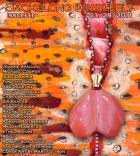“Wound Glue” is an amazingly layered story that becomes richer with each reading. What was your inspiration?
I read in the news last year an anecdote about a cat who lost its face in a lawnmower mishap. That cat popped up in one or two failed drafts of mine, but never in a way that seemed to resonate beyond plain weirdness or dismay that someone could let this happen to a pet.
More recently, I discovered an art dealer who sells antique plates on a site called Beat Up Creations. These are wonderful portrait plates where animal heads are grafted onto human bodies.
These two particles seemed to fit. They raised enough questions for me so that a scenario began to take shape.
You use second-person. What do you like about using the “you” point-of-view in “Wound Glue”? Can you talk a little about p-o-v and how you decide which to use?
Flash fiction’s brevity inhibits characterization. It’s a form that reminds me of those old debates between William Gass and John Gardner, the former contending that a character in prose is just a name to which the writer attaches certain attributes. X wears a retainer at night and likes fast cars.
While I think that Gass is denying how involved we become with fictional characters, his argument makes sense in terms of flash fiction’s bare-boned structure; we just don’t have the space to flesh out fully-rounded personas. “You” automatically implicates the reader. For the reader, it’s a perspective that might bestow humanity more immediately than a name or a third-person voice.
What kind of reaction do you want your readers to have when they read your work? Do you think about this and at what point?
I think that an acute awareness of audience is dangerous early in the drafting process. It’s only going to limit your options, like writing a piece with a rigid workshop aesthetic in mind, or anticipating the complaints of a dozen hardcore realists when you are inclined to work in a different mode.
This said, I do write with a few specific people in mind, people whose work and perspectives on writing I regard very highly, people who would be quick to tell me that I’m being heavy-handed or manipulative. This isn’t inhibitive at all, but more like Hemingway’s line about building your own shit detector in critiquing your work.
Can you give us the short Wiki of Michael Cooper’s oeuvre? What are you working on now?
I’m a Ph.D. candidate at Florida State University, where I’m finishing a collection of short stories for my dissertation. At some point in the not-so-distant future, I hope to finish at least one of the two longer projects that I’ve also been working on, as well. Finishing them both would be great, like sometime in the not-so-distant future.
Anything you’d like to say to writers out there who are looking for their voices?
I’ve always liked Anne Lamott’s advice to just slog through a shitty first draft. No matter how bad the writing might seem for the first couple of paragraphs or pages, we tend to reach a point in early drafting when fresh, impressionistic details start to emerge. The writing begins to pop a little, we hope, and it seems as though we’ve discovered a way of exerting our authority in that particular piece.



 The core workshop of SmokeLong Fitness is all in writing, so you can take part from anywhere at anytime. We are excited about creating a supportive, consistent and structured environment for flash writers to work on their craft in a community. We are thrilled and proud to say that our workshop participants have won, placed, or been listed in every major flash competition. Community works.
The core workshop of SmokeLong Fitness is all in writing, so you can take part from anywhere at anytime. We are excited about creating a supportive, consistent and structured environment for flash writers to work on their craft in a community. We are thrilled and proud to say that our workshop participants have won, placed, or been listed in every major flash competition. Community works.